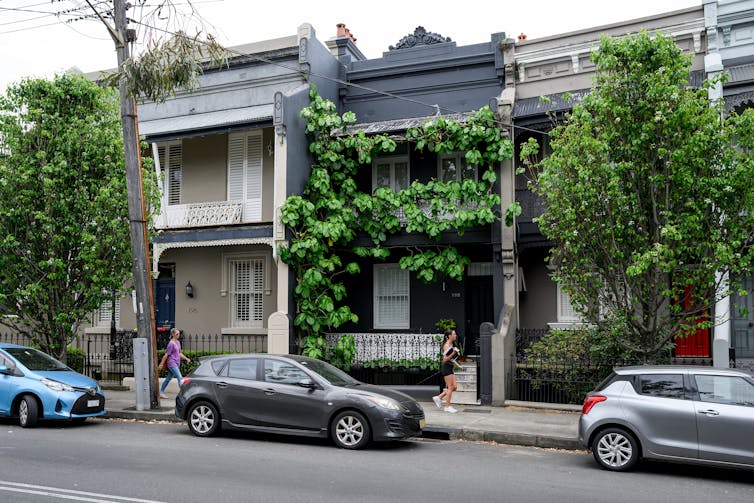Here’s what new debt-to-income home loan caps mean for banks and borrowers
- Written by Adrian Lee, Associate Professor in Property and Real Estate, Deakin University

For the first time ever, the Australian banking regulator has announced it will impose new debt-to-income limits[1] on housing loans made by banks.
Such limits are a common tool used by regulators in other nations[2] – including the United Kingdom, Ireland, New Zealand and Canada – to cool housing market lending. The aim is to prevent meltdowns like we saw in the global financial crisis in 2008.
Here’s what’s changing – and what it could mean for prospective home buyers and the housing market as a whole.
What’s been announced
When you apply to take out a loan at a bank, one of their key considerations is how much income you earn each year, compared to the size of the loan.
Having a high debt-to-income ratio – earning relatively less compared to the amount borrowed – is considered riskier.
Until now, there there have been no debt-to-income limits on banks, though other controls such as the serviceability buffer[3], help curb high-risk lending.
Read more: How do banks assess you for a home loan? And how do you work out what you can afford?[4]
From February 1 2026, the Australian Prudential and Regulatory Authority (APRA)[5] will make banks and other lenders limit the share of new home loans with a high debt-to-income ratio – above or equal to six times before-tax income – to 20% of their new mortgage lending.
For a prospective borrower on the average taxable income of about A$75,000[6], this ratio would theoretically allow for a loan of up to $450,000.
The limit will apply separately to owner-occupier and investment home loans, meaning those loans won’t be grouped together as a single pool to calculate the 20% limit for each bank. The limits exclude bridging loans[7] for owner-occupiers and loans for the construction of new homes.
Figures[8] cited by APRA show Australia’s new ratio is roughly on par with a similar limit in New Zealand (six to seven times income) but notably higher than that of similar policies in Ireland (3.5 to four times income) and Canada (4.5 times income).

How will it work?
Banks will need to monitor the new home loans they issue to ensure no more than 20% of loans have a high debt-to-income ratio. This will be measured quarterly.
While the debt-to-income limit is new, APRA has intervened previously with other limits. For example, in 2017, it imposed limits on the percentage of new interest-only mortgages[10] banks could write (though these limits were lifted at the beginning of 2019[11]).
What does this mean for getting a loan?
It’s important to note the rules won’t stop banks issuing loans with a debt-to-income ratio above six. It will just restrict the amount of these they can issue.
But the new regulations raise a fair question – if you’re applying for a “high-risk” home loan, will getting one now depend on how many other high risks home loans your bank has handed out?
Well, sort of. The limits will only affect borrowers with a high debt-to-income ratio if the bank they are applying to is near or has hit their limit in a given quarter.
APRA expects[12] some banks to hit such limits within the near future without intervention.
This would make such banks more selective in choosing which loans to approve. It’s possible some could even increase their mortgage rates to deter such loans.
There will be no effect on low debt-to-income borrowers’ ability to obtain a mortgage. Keep in mind existing borrowers are unaffected unless they choose to refinance.
What other effects could there be?
There was no significant reaction to the announcement in the price of Australian bank stocks, suggesting market pundits don’t see the limits hitting bank profitability.
However, studies in other countries, such as the United States[13] and the Netherlands[14], show debt-to-income and other such limits are effective at curbing risky loans and reducing household stress.
But it can have some unintended side effects. In one Norwegian study[15], modelling showed debt-to-income limits reduce household debt and housing prices, but also prevent those on low incomes from moving as they are unable to borrow.
This lack of mobility then creates an inequality in the access of better opportunities.
A related study[16], examining the housing market in Israel, found such limits force some borrowers to buy in cheaper areas with higher commuting costs which are more socio-disadvantaged.
APRA’s balancing act
APRA has used these limits as a new tool to stop risky loans being made. While the current limits won’t affect lending in a big way, the regulator is signalling to borrowers and lenders that they are concerned about risky borrowing and may continue to take action.
As shown elsewhere, more restrictive actions can have the desired effect of reducing risky loans, and therefore curbing housing market crashes.
But such limits can also worsen inequalities, particularly for those already financially constrained. And they could have indirect impacts on prospective first-home buyers looking to take advantage of Labor’s expanded 5% deposit scheme[17] – which by design, allows people to take out larger loans than they otherwise would have been able.
References
- ^ debt-to-income limits (www.apra.gov.au)
- ^ in other nations (www.apra.gov.au)
- ^ serviceability buffer (theconversation.com)
- ^ How do banks assess you for a home loan? And how do you work out what you can afford? (theconversation.com)
- ^ Australian Prudential and Regulatory Authority (APRA) (www.apra.gov.au)
- ^ about A$75,000 (www.ato.gov.au)
- ^ bridging loans (moneysmart.gov.au)
- ^ Figures (www.apra.gov.au)
- ^ Bianca De Marchi/AAP (photos.aap.com.au)
- ^ interest-only mortgages (theconversation.com)
- ^ lifted at the beginning of 2019 (www.apra.gov.au)
- ^ expects (www.apra.gov.au)
- ^ United States (doi.org)
- ^ the Netherlands (doi.org)
- ^ Norwegian study (papers.ssrn.com)
- ^ related study (doi.org)
- ^ 5% deposit scheme (theconversation.com)

















